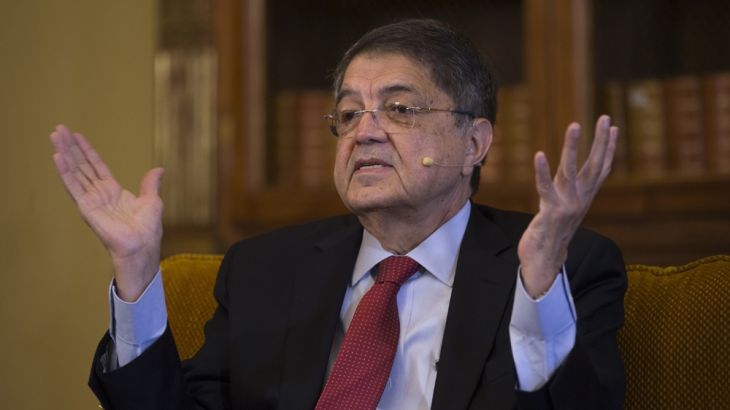
Sergio Ramirez: Ortega is facing a bloody reality check
The former Nicaraguan vice president discusses the ongoing opposition to President Daniel Ortega.
When Nicaragua’s President Daniel Ortega overthrew the country’s Somoza dictatorship in 1979, Sergio Ramirez was standing by his side.
Now, the poet and novelist is among Ortega’s most vocal critics, saying the thirst for power has changed him.
Keep reading
list of 4 items‘Prejudice, Islamophobia’: Free speech fears as UK redefines extremism
Dominican FM on Haiti gang violence crisis: Spillover threat?
In India’s richest state, exam scams kill escape from farm crisis
“If someone says ‘I’m staying no matter what’ they have to crash into a wall of reality that usually gets stained with blood because that is not natural in a democratic system and that’s what’s happening in Nicaragua“.
The Central American country has been in extreme disarray since April when students took to the streets in the capital, Managua, to protest the government’s failure to handle forest fires in one of the country’s most protected areas.
Two days later, numbers swelled as plans to cut pensions and other social security reforms were announced and protests morphed into calls for the country’s ageing leader to resign.
“I think that it’s like the power of a dam that has been broken with the water … people have suffered many grievances. All the fear that’s been created, the social control in neighbours, much like Venezuela, much like Cuba,” he says.
“All these things began to create feelings of rejection and weariness … a feeling of having had enough that was in the mouths of many people and was waiting to just explode.”
Ortega responded with a brutal crackdown, allegedly using paramilitary groups to put down protests. He, and his wife and vice president blame the protests on so-called “terrorists” and have refused calls for an early election to defuse the crisis.
According to the Nicaraguan Association for Human Rights, some 448 people have been killed since protests began, many are university students who have been a key force in the demonstrations.
Ramirez is critical of Ortega’s response, saying the levels of violence are worse than during the Sandinista revolution.
“These are unarmed casualties, people who are being persecuted, hunted by snipers, killed by machine guns, people who are burned to death in their homes, shot in the head in the middle of the street. It’s something without precedents in the history of Nicaragua,” he says.
Serving as vice president from 1985 to 1990, Ramirez split from Ortega to form his own party in 1995 after becoming disillusioned with the direction of Ortega’s policies.
“The Sandinista Front sank in 1990 because of Ortega’s insistence to turn away from the democratic rules and violently confront the then-President Violeta Chamorro who had been legitimately elected with street riots, barricades, destruction of public buildings, gangs armed with sticks taking over public buildings – Everything he condemns now is what he did to obstruct Mrs Chamorro’s government,” he says.
The country – already Central America’s poorest – is suffering economic ruin from the crisis and thousands are fleeing to neighbouring Costa Rica to seek asylum.
“Can things ever go back to the way they were before April 18th? Can Ortega rebuild consensus somehow? In a peaceful matter, or based on fear? … [The] grievances against the same families who were Ortega’s supporters make it impossible to rebuild the social fibre that existed before.”
“Maybe it’s me being naive, but I think that this is the first time this country has the opportunity to resolve a dictatorial conflict through civic means. It’s a historical opportunity for Nicaragua”.